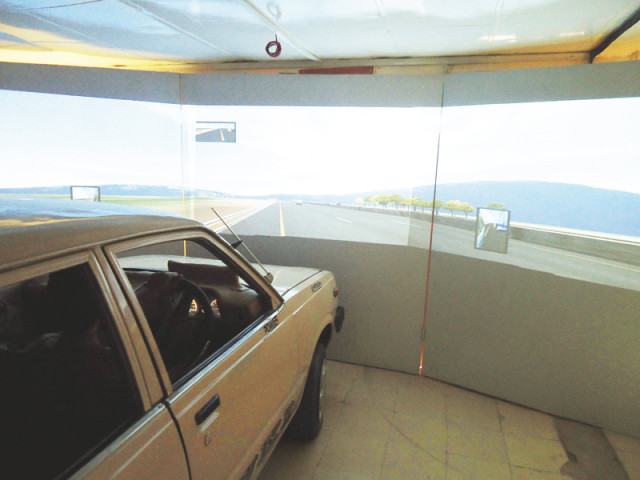Computerised driving school: Virtual drive
At the computerised driving school in Peshawar students must keep their eyes on the screen.

The fully computerised driving system at the Traffic Police Driving School Peshawar Cantt, established on December 12, 2008, by the traffic police, is the first of its kind. It was initially proposed by Senior Superintendent of Police (SSP) Traffic, Muhammad Jaffer Khan, who used his own resources to set up the school that would allow learners to emerge as better drivers, making his job easier.
The enterprising idea elicited support from everyone and the hired staff of seven graduates received basic training for rules on the road from the Motorway Police Academy, Sheikhupura. Although the school was initially working without a simulator, it was soon arranged for and entirely funded by the Traffic Police Peshawar. “[Now] we have a computerised training system as per foreign [standards], it’s called a Driving FX Simulator and costs around Rs230,000,” says traffic police inspector and head of the driving school, Ejaz Khan, adding that engineers from Karachi completed the installations.
Sort of like attending a computer class at school, students here find themselves seated in the front seat of a car and staring at a large screen. They are comparatively less nervous than they would be if they were driving on the roads, confronted with the actual threat of ramming into a minibus or a car while parallel parking. As the seasons on the screen before them switch between winter and summer, they must maneuver the four-wheeler attached to 3D projectors, to reach their destination safely.
The simulator poses real-life challenges — things every resident in Peshawar should be wary of. Students must be alert at all times in case a suicide bomber threateningly stops before their car. Along with accidents, they are taught how to react in multiple life-threatening situations, prioritising their safety above all.
The programme has consequently become quite popular among students. “Students approach us with enthusiasm and passion which shows their interest towards learning how to drive [based on simulation],” says instructor Mian Kashif. “They are doing great at the school and after [completing their course] they get their driving licenses as well.” Each batch comprises around 70 to 80 students out of which 15 to 20 are females. For Rs3,500, they gain a well-rounded learning experience that encompasses theory as well as practical learning. The course lasts 21 days, excluding government holidays, and the students are divided into two shifts throughout the day, the first lasting for 8am to 12pm and the second from 2pm to 5pm. Once they complete the course and clear the tests, they put their acquired knowledge and skills to test on the roads.
“Training [via] stimulator is just as if you are playing a video game that looks almost real. I think it is a good [way to] learn driving before one can take [their] car [out] on the roads without knowing how to drive it,” says Ayub, a student at the school. According to him parents feel secure knowing that their children are learning how to drive in a safe environment.
So far, nearly 4,000 students have emerged as certified drivers from the school and the numbers are only multiplying. “The increasing rate at which students are joining the school every month shows that they are interested in learning stimulation-based driving,” says Khan, adding that those who leave the school recommend it to others. Students who come to him from all over Pakistan agree that this virtual driving lesson even prepares them for unexpected dangers on the road. Khan has also trained students on the manual car, but feels particularly proud to be a part of this programme.
Owing to its success, the school has even opened up a second branch in phase 5, Principal road, Hayatabad. But its actual triumph can be gauged by the increase in responsible driving in Peshawar which has been the programme’s mission since inception.
Fazal Gilani is a freelance journalist and former news reporter. He tweets @Gilaniism
Published in The Express Tribune, Sunday Magazine, July 13th, 2014.



















COMMENTS
Comments are moderated and generally will be posted if they are on-topic and not abusive.
For more information, please see our Comments FAQ